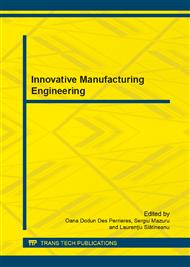[1]
W.A. Harrison, Pseudopotentials in the Theory of Metals, Benjamin, New York, (1966).
Google Scholar
[2]
J. Hafner, From Hamiltonians to Phase Diagrams – The Electronic and Statistical-Mechanical Theory of s, p Bonded Metals and Alloys, Springer, Berlin, (1987).
Google Scholar
[3]
N.A. Vatolin, A.A. Yuryev, N. E. Dubinin, Calculation of the thermodynamic properties of liquid Na-K-Cs alloy by pseudopotential method, Dokl. Akad. Nauk 323 (1992) 880-884.
Google Scholar
[4]
N.E. Dubinin, A.A. Yuryev, N.A. Vatolin, Thermodynamic properties of ternary liquid metal alloys, High Temperature Materials and Processes 14 (1995) 285-290.
DOI: 10.1515/htmp.1995.14.4.285
Google Scholar
[5]
N.E. Dubinin, A.A. Yuryev, N.A. Vatolin, Thermodynamics of alkali-alkali liquid alloys. Calculation by pseudopotential method and thermodynamic perturbation theory, Thermochimica Acta 316 (1998) 123-129.
DOI: 10.1016/s0040-6031(98)00312-8
Google Scholar
[6]
N.E. Dubinin, Alkali metals melts thermodynamics, J. Optoelectronics and Advanced Materials 5 (2003) 1259-1262.
Google Scholar
[7]
N.E. Dubinin, A.A. Yuryev, N.A. Vatolin, Gibbs-Bogoliubov variational procedure with the square-well reference system, J. Non-Equilibrium Thermodynamics 35 (2010) 289-300.
DOI: 10.1515/jnetdy.2010.018
Google Scholar
[8]
W.A. Harrison, Transition-metal pseudopotentials, Phys. Rev. 181 (1969) 1036-1053.
Google Scholar
[9]
J.A. Moriarty, Pseudo Green's functions and the pseudopotential theory of d-band metals, Phys. Rev. B 5 (1972) 2066-(2081).
Google Scholar
[10]
J.A. Moriarty, Density-functional formulation of the generalized pseudopotential theory. III. Transition-metal interatomic potentials, Phys. Rev. B 38 (1988) 3199-3231.
DOI: 10.1103/physrevb.38.3199
Google Scholar
[11]
Y.K. Kovneristyi, N.A. Vatolin, E.G. Gurskaya, A.I. Landa, M.V. Romankevitch, A.A. Yuryev, Ab initio calculation of the thermodynamic properties of liquid alloys with the application to Ni-Al. Nonlocal resonant pseudopotential approach, J. Non-Cryst. Solids 117 (1990).
DOI: 10.1016/0022-3093(90)90601-h
Google Scholar
[12]
A.I. Landa, A.A. Yuryev, A.V. Ruban, E.G. Gurskaya, Y.K. Kovneristyi, N.A. Vatolin, Pseudopotential calculation of thermodynamic properties and glass transition temperatures of binary Ni-Al alloys, J. Phys.: Condens. Matter 3 (1991) 9229-9243.
DOI: 10.1088/0953-8984/3/46/022
Google Scholar
[13]
J.L. Bretonnet, M. Silbert, Interionic interactions in transition metals. Application to vanadium, Phys. Chem. Liq. 24 (1992) 169-176.
DOI: 10.1080/00319109208027266
Google Scholar
[14]
N. Jakse, J.L. Bretonnet, Structure and thermodynamics of liquid transition metals: integral-equation study of Fe, Co and Ni, J. Phys.: Condens. Matter 7 (1995) 3803-3815.
DOI: 10.1088/0953-8984/7/20/002
Google Scholar
[15]
N.E. Dubinin, L.D. Son, N.A. Vatolin, Thermodynamic properties of liquid binary transition-metal alloys in the Bretonnet-Silbert model, Defect and Diffusion Forum. 263 (2007) 105-110.
DOI: 10.4028/www.scientific.net/ddf.263.105
Google Scholar
[16]
O.K. Andersen, Linear methods in band theory, Phys. Rev. B 12 (1975) 3060-3083.
Google Scholar
[17]
W.A. Harrison, S. Froyen, Uniersal linear-combination-of-atomic-orbitals parameters for d-state solids, Phys. Rev. B 21 (1980) 3214-3221.
DOI: 10.1103/physrevb.21.3214
Google Scholar
[18]
J.M. Wills, W.A. Harrison, Interionic interactions in transition metals, Phys. Rev. B 28 (1983) 4363-4373.
DOI: 10.1103/physrevb.28.4363
Google Scholar
[19]
N.E. Dubinin, Account of non-diagonal coupling between d electrons at describing the transition-metal pair potentials, J. Phys.: Conf. Series 338 (2012) 012004.
DOI: 10.1088/1742-6596/338/1/012004
Google Scholar
[20]
P. Vashishta, K. Singwi, Electron correlation at metallic densities, Phys. Rev. B 6 (1972) 875-887.
DOI: 10.1103/physrevb.6.875
Google Scholar
[21]
N.E. Dubinin, L.D. Son, N.A. Vatolin, The Wills-Harrison approach to the thermodynamics of binary liquid transition-metal alloys, J. Phys.: Condens. Matter 20 (2008) 114111.
DOI: 10.1088/0953-8984/20/11/114111
Google Scholar
[22]
Y. Waseda, The Structure of Non-crystalline Materials – Liquids and Amorphous Solids, McGraw-Hill, New York, (1981).
Google Scholar


